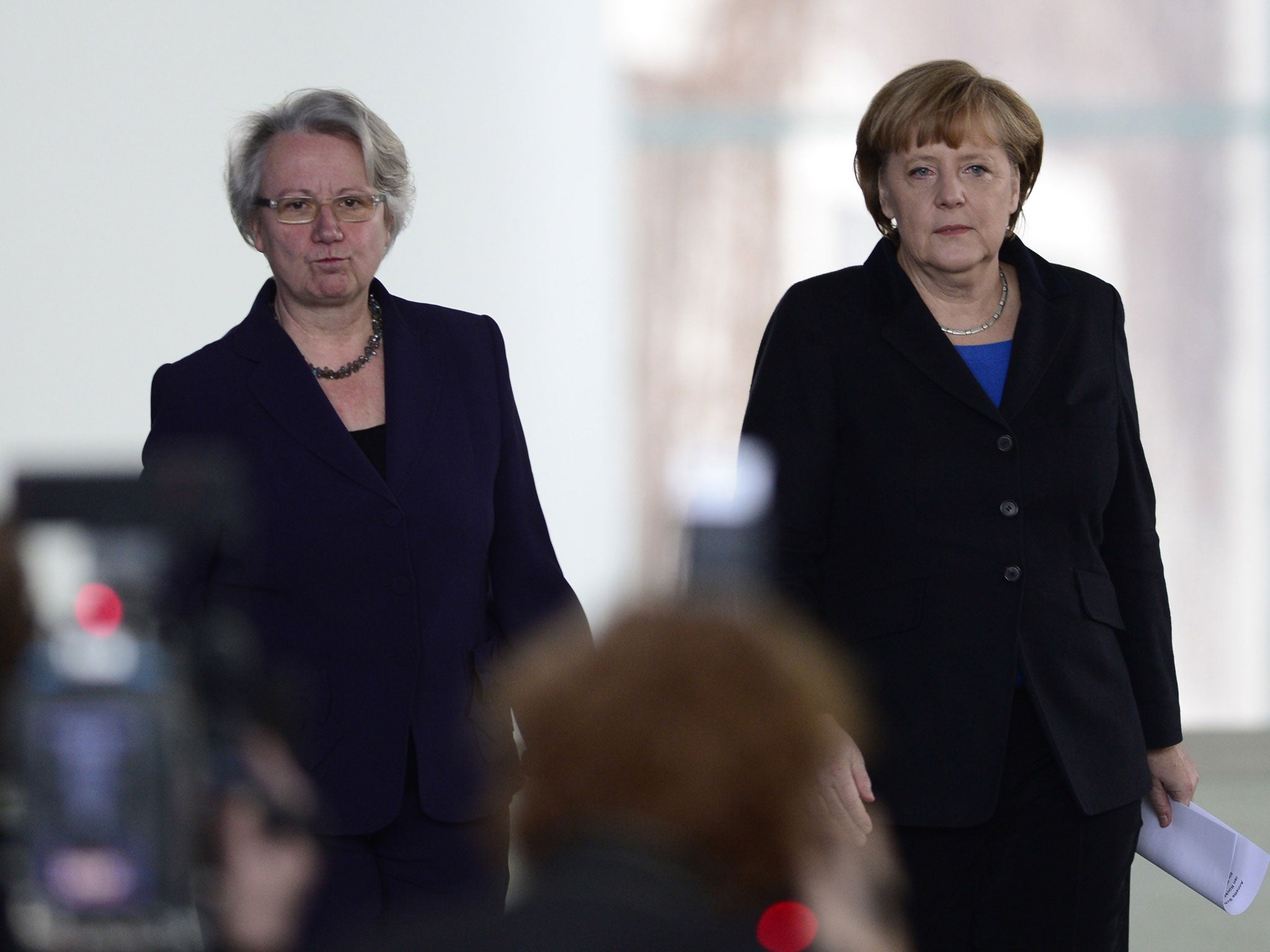Angela Merkel ally quits over 'copied' PhD
Germany's Education Minister resigns after claims that she plagiarised parts of her doctoral thesis 30 years ago

Germany's Minister of Education resigned yesterday after a university withdrew her doctorate, having decided she plagiarised parts of her thesis, a claim she has denied.
This is embarrassing for Chancellor Angela Merkel's government as it prepares for elections later this year. Mrs Merkel said she had accepted "only with a very heavy heart" the resignation of Annette Schavan, who has been the Minister of Education and Research since 2005 and was considered close to the Chancellor.
Mrs Schavan's resignation comes two years after the then minister of defence, Karl-Theodor zu Guttenberg, lost his doctorate and quit when it emerged that he had copied large parts of his doctoral thesis. Doctorates are highly prized in Germany, where it is not unusual for people to insist on being referred to by their academic title.
On Tuesday, Düsseldorf's Heinrich Heine University decided to revoke Mrs Schavan's doctorate, following a review of her 1980 thesis, which dealt with the formation of conscience. The review was undertaken after an anonymous blogger last year raised allegations of plagiarism, which the minister denies. "I will not accept this decision – I neither copied nor deceived in my dissertation," she told reporters, speaking alongside Mrs Merkel at a brief news conference. "The accusations... hurt me deeply."
Mrs Schavan made clear that she was going to prevent the issue turning into a festering problem for her party, and the government, as Germany gears up for parliamentary elections on 22 September in which the conservative Mrs Merkel will seek a third term. Mrs Schavan, a member of the Chancellor's Christian Democratic Union, announced her decision after returning from an official trip to South Africa during which, she said, she thought "thoroughly" about the political consequences. "If a research minister files a suit against a university, that of course places strain on my office, my ministry, the government and the CDU as well," she said. "And that is exactly what I want to avoid."
Mrs Merkel offered lengthy praise for Mrs Schavan's "exceptional" performance as a minister, adding that, "at this time, she is putting her own personal well-being behind the common good". Mrs Schavan will be replaced by Johanna Wanka, the outgoing regional education minister in the state of Lower Saxony, in north-west Germany, Mrs Merkel said. That state's conservative-led government narrowly lost a regional election to the centre-left opposition last month.
Despite the coalition government's setback in Lower Saxony, polls show that Mrs Merkel remains popular with voters; her challenger from the centre-left Social Democrats, Peer Steinbrück, has struggled to gain support. Most recent polls show a majority neither for Mrs Merkel's current centre-right coalition with the pro-market Free Democrats nor for a rival combination of the Social Democrats and Greens.
They also show Mrs Merkel's conservative Christian Democrats to be the strongest single party. That suggests the Chancellor may be able to carry on with a new coalition partner. It's also unclear whether the Schavan affair will provide political ammunition for the opposition.
The usually low-profile minister's troubles over her three-decade-old thesis have drawn a much more measured response from opponents than in the case of Mr Guttenberg, a rising conservative star at the time he quit. On Friday, Sigmar Gabriel, the chairman of the Social Democrats, described Mrs Schavan as "a notably smart and, from my point of view, decent colleague".
Join our commenting forum
Join thought-provoking conversations, follow other Independent readers and see their replies
Comments